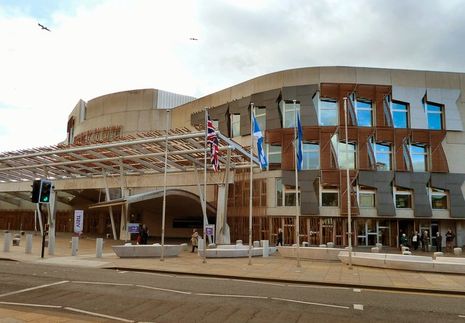What Scotland can teach us about Reform’s coming wave
Jasper Finlay Burnside argues that as Reform’s popularity grows, we ignore the politics of the devolved nations at our own peril

In May of 2026, Scotland will go to the polls for the seventh time since devolution. This and the Senedd elections are a midterm test for the Labour government, and a crisis point for the mainstream parties. John Swinney, the SNP’s beige Machiavel, will remain first minister.
The unfortunate question remains: Who will the opposition be? Labour, palpably unpopular, is set to lose seats. Kemi Badenoch’s policy invisibility has further sunk Tory leader Russell Findlay’s non-existence as a real political figure, showing that the Conservatives lack ideas, direction, or any real hope of competence. As it stands, it looks like Reform will do well. It may even become the main opposition party. Regardless, the seats that it wins will allow Reform to gain further legitimacy and bolster its claims to be the opposition to the Labour government.
“These midterm elections are the building blocks for Reform in the next general election”
There is widespread ignorance among many in England about the growing wave on the horizon in the devolved nations, including Wales, where the situation appears at least equally precarious. This indifference leaves us collectively in a perilous moment, and a missed opportunity to understand how to deal with Reform and return to consummate politics.
After almost two decades of SNP rule, there is a yearning for change, or at least some decent opposition. This time last year, following SNP first minister Humza Yousaf’s ignominious resignation, the ascent of Anas Sarwar, Scottish Labour’s leader, seemed almost assured. Yet, following the stabilisation of the SNP, and UK Labour’s failure of messaging and leadership, Sarwar has been snatched from the precipice of leadership, and thrown again on the back foot. Due to Kemi Badenoch’s invisibility, the Conservatives seem to be less of a party and more of a round-up of the usual suspects without vision or strategy. In this void, Reform can take votes from both Labour and the Conservatives. The failure of Scottish Labour and the Conservatives to offer an effective alternative to the SNP government and to Reform will be their undoing, and has repercussions for the UK at large.
“There is widespread ignorance among many in England about the growing wave on the horizon in the devolved nations”
Reform will likely do well at the next election, with current polling suggesting they will be the second or third largest party. Fortunes can change, but traditional party voters disaffected by the Westminster and SNP governments can now vote for a party lacking the immense baggage and contradictions of Labour or the Conservatives. Former Labour seats in the east end of Glasgow, and disaffected Tory voters in the Highlands, can vote for a party which loudly opposes the agenda moved by the SNP and other progressive parties, which have so long clobbered the right in Scottish politics. Reform’s ambivalence towards independence, its active wish to see the expansion of oil and gas production, its war on DEI, and its general ability to message mean that it has an exceptional opportunity to win seats, not just as a protest vote, but seemingly as a valid alternative.
Last month, in a feigning attempt to take action, John Swinney convened a conference of left-wing parties (The Scottish Conservatives chose not to attend), faith leaders, and other activists to deal with the threat from ‘Far-Right’ Reform. This was little more than hot air from the curtain-twitching chattering classes. These parties seem to have forgotten how to be competitive and how to fight in the treacherous grounds of competitive politics. The traditional parties, perhaps except for the SNP, have become impotent in a malaise of indifference when appealing to voters on the real issues that matter to them. Indeed, the SNP’s attempts to label Reform as a far-right party, accurate as this may be, is not an argument. Saying that other parties are bad is not an argument. Where is the policy, where is the argument about Nigel Farage’s past, his incompetence, his campaigning for Brexit, and the implausibility of his vision for the UK? Where is the reality that this man, and by extension the party he controls, is inept and potentially reckless?
This current failure is just one in a long line of cowardice from the main political parties. It is the same cowardice and political failure that have allowed the SNP to remain in office for almost a decade without a real rival or alternative, establishing dominance. Scottish Labour lost touch with people, allowing the SNP to unite and sweep them into office. It is the same cowardice and failure to engage that will allow Reform to legitimise itself and eviscerate the mainstream parties.
These midterm elections are the building blocks for Reform in the next general election. Should Reform win they will undoubtedly be attention-grabbing, not least for the voters, but for the Labour and Tory party machinery. It will prove that Reform can work in a devolved manner in large numbers, outside of councils, showing that they don’t just talk hot air, but can be a real alternative force. By no means is this certain; the SNP will remain in government for another five years, but these midterms provide the most significant challenge to Labour’s government and the largest change to the UK’s political landscape in generations.
 News / Colleges charge different rents for the same Castle Street accommodation2 March 2026
News / Colleges charge different rents for the same Castle Street accommodation2 March 2026 News / News in Brief: waterworks, wine woes, and workplace wins 1 March 2026
News / News in Brief: waterworks, wine woes, and workplace wins 1 March 2026 News / Climate activists protest for ‘ethical careers policy’1 March 2026
News / Climate activists protest for ‘ethical careers policy’1 March 2026 News / Angela Merkel among Cambridge honorary degree nominees27 February 2026
News / Angela Merkel among Cambridge honorary degree nominees27 February 2026 News / Private school teacher who lied about Cambridge degree barred from teaching27 February 2026
News / Private school teacher who lied about Cambridge degree barred from teaching27 February 2026









